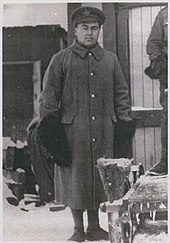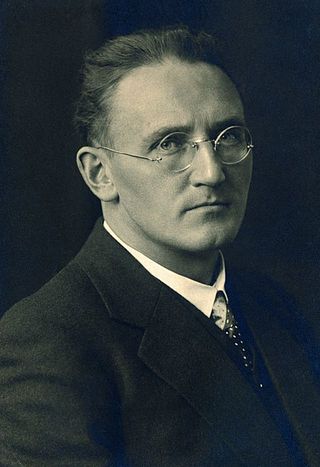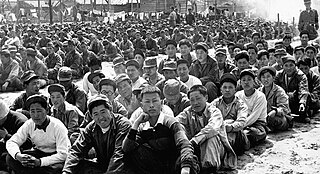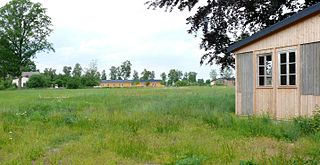
The POW Camp 23, Monteith was a Canadian-run POW camp during World War II, located in Monteith, Iroquois Falls, Ontario.

The POW Camp 23, Monteith was a Canadian-run POW camp during World War II, located in Monteith, Iroquois Falls, Ontario.
Before World War II, the camp was a lumber camp employing about forty men. Board lumber was cut on site and shipped about 8 km to the rail line.[ citation needed ]
In July 1940, the camp was converted into POW Camp Q, later called Camp 23, by the Canadian government. [1] [2] The camp had a maximum capacity of 4000. [3] The prisoners included interned German nationals in addition to captured German soldiers. The German national internees, as distinct from prisoners of war, had largely been classified as "enemy aliens", many shipped from Britain after the fall of France in 1940 under Churchill's "collar the lot" edict. As most of these were in fact Jewish or political refugees from the Nazi regime (and so would have formally had their German citizenship withdrawn by the authorities there, thus being effectively stateless, even if this factor was not realised or recognised in the UK), after vetting many were allowed to return to Britain to join the armed forces. [4]
One such interned German national was Wulff Scherchen, the 20-year old son of the German conductor Hermann Scherchen, who was living in Cambridge when he was arrested in 1940 and shipped to Canada. Wulff Scherchen was the romantic interest of Benjamin Britten, himself only 26 at the time. Many of his letters to Britten from Camp Q (POW Camp 23) survive. Over 80 years later, with his consent, these heartfelt letters were made into an orchestral song cycle called Serenade for Tenor, Saxophone and Orchestra by composer Lyle Chan. [5]
The camp ceased operating as a military POW camp in 1946 [6] and became a provincial reformatory known today as the Monteith Correctional Complex.

Hermann Scherchen was a German conductor, who was principal conductor of the city orchestra of Winterthur from 1922 to 1950. He promoted contemporary music, beginning with Schoenberg's Pierrot Lunaire, followed by works by Richard Strauss, Anton Webern, Alban Berg, Edgard Varèse, later Iannis Xenakis, Luigi Nono and Leon Schidlowsky. He usually conducted without using a baton.

A prisoner-of-war camp is a site for the containment of enemy fighters captured as prisoners of war by a belligerent power in time of war.
Marlag und Milag Nord was a Second World War German prisoner-of-war camp complex for men of the British and Canadian Merchant Navy and Royal Navy. It was located around the village of Westertimke, about 30 km (19 mi) north-east of Bremen, though in some sources the camp's location is given as Tarmstedt, a larger village about 4 km (2.5 mi) to the west. There were also American merchant seamen detained here as well as some U.S. Navy personnel.

The Atlit detainee camp was a concentration camp established by the authorities of Mandatory Palestine in the late 1930s on what is now the Israeli coastal plain, 20 kilometres (12 mi) south of Haifa. Under British rule, it was primarily used to hold Jews and Arabs who were in administrative detention; it largely held Jewish immigrants who did not possess official entry permits. Tens of thousands of Jewish refugees were interned at the camp, which was surrounded by barbed wire and watchtowers.
A civilian internee is a civilian detained by a party to a war for security reasons. Internees are usually forced to reside in internment camps. Historical examples include Japanese American internment and internment of German Americans in the United States during World War II. Japan interned 130,000 Dutch, British, and American civilians in Asia during World War II.

Britten's Children is a scholarly 2006 book by John Bridcut that describes the English composer Benjamin Britten's relationship with several adolescent boys. Bridcut has been praised for treating such a sensitive subject in "an impeccably unsensational tone". The Britten-Pears Foundation described the book as having been "enthusiastically received as shedding new light on one of the most interesting aspects of Britten's life and career, in a study that is thoroughly researched, wonderfully readable and thought-provoking". Bridcut's book followed his television documentary Britten's Children shown on BBC2 in June 2004.
Oflag VII-B was a World War II German prisoner-of-war camp for officers (Offizierlager), located in Eichstätt, Bavaria, about 100 km (62 mi) north of Munich.

Stalag X-B was a World War II German prisoner-of-war camp located near Sandbostel in Lower Saxony in north-western Germany. Between 1939 and 1945 several hundred thousand POWs of 55 nations passed through the camp. Due to the bad conditions in which they were housed, thousands died there of hunger, disease, or were killed by the guards. Estimates of the number of dead range from 8,000 to 50,000.

Internment of German resident aliens and German-American citizens occurred in the United States during the periods of World War I and World War II. During World War II, the legal basis for this detention was under Presidential Proclamation 2526, made by President Franklin Delano Roosevelt under the authority of the Alien Enemies Act.

Members of the German military were interned as prisoners of war in the United States during World War I and World War II. In all, 425,000 German prisoners lived in 700 camps throughout the United States during World War II.

Pithiviers internment camp was a concentration camp in Vichy France, located 37 kilometres northeast of Orléans, closely associated with Beaune-la-Rolande internment camp in deporting foreign-born and some French-born Jews between 1941 and 1943 during WWII.

Beaune-la-Rolande internment camp was an internment and transit camp for foreign-born Jews, located in Beaune-la-Rolande in occupied France, it was operational between May 1941 and July 1943, during World War II.

Wauwilermoos was an internment camp and prisoner-of-war penal camp in Switzerland during World War II. It was situated in the municipalities of Wauwil and Egolzwil in the Canton of Lucerne (Luzern). Established in 1940, Wauwilermoos was a penal camp for internees, including Allied soldiers, among them members of the United States Army Air Forces, who were sentenced for attempting to escape from other Swiss camps for interned soldiers, or other criminal offences. Together with Hünenberg and Les Diablerets, Wauwilermoos was one of three Swiss penal camps for internees that were established in Switzerland during World War II. The intolerable conditions were later described by numerous former inmates and by various contemporary reports and studies.
John Woolford was the muse, confidant, and the first romantic interest of the composer Benjamin Britten.
Serenade for Tenor, Saxophone and Orchestra is a musical composition by Lyle Chan.
Italian prisoners of war in Australia were Italian soldiers captured by the British and Allied Forces in World War II and taken to Australia.